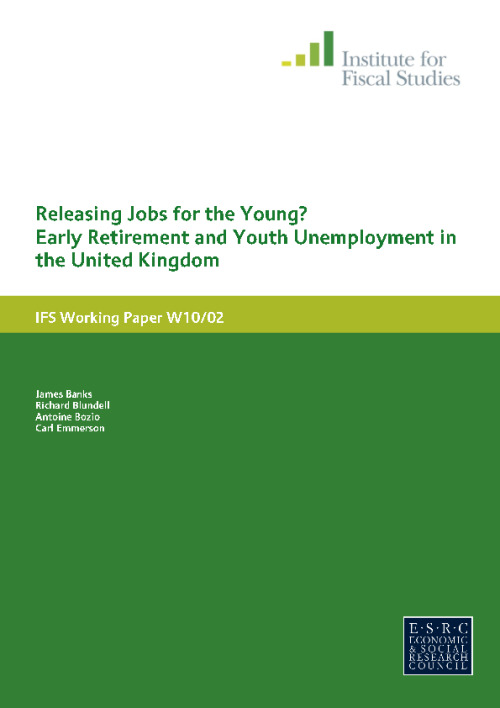Downloads

wp1002.pdf
PDF | 413.38 KB
<p>This paper tries to assess whether or not we have any empirical evidence of links between early retirement and youth unemployment. Most economists would today dismiss the idea immediately as another version of the naïve 'lump-of-labor fallacy'. In its most basic form, this proposition holds that there is a fixed supply of jobs and that any reduction in labor supply will reduce unemployment by offering jobs to those who are looking for ones. Taken to the extreme, this view would support that the idea that a high level of employment of one group of individuals can only be at the expense of another group: if for instance were the population of a country to increase, younger individuals would be unemployed as older individuals would not 'release' enough jobs for the new entrants. The absurdity of this view in the long term is simply seen by considering the fact that the size of a country does not bear any relation to the share of population unemployed. </p>
Authors

CPP Co-Director
James is Senior Research Fellow and Professor of Economics at Manchester, working on broad issues in the economics of retirement, savings and health.

Deputy Director
Carl, a Deputy Director, is an editor of the IFS Green Budget, is expert on the UK pension system and sits on the Social Security Advisory Committee.

CPP Co-Director
Richard is Co-Director of the Centre for the Microeconomic Analysis of Public Policy (CPP) and Senior Research Fellow at IFS.

Research Fellow Paris School of Economics
Antoine is a Research Fellow, an Associate Professor at the EHESS, and Director of the Institut des Politiques Publiques (IPP) in Paris.
Working Paper details
- DOI
- 10.1920/wp.ifs.2010.1002
- Publisher
- IFS
Suggested citation
Banks, J et al. (2010). Releasing jobs for the young? Early retirement and youth unemployment in the United Kingdom. London: IFS. Available at: https://ifs.org.uk/publications/releasing-jobs-young-early-retirement-and-youth-unemployment-united-kingdom (accessed: 30 June 2024).
More from IFS
Understand this issue

Election Special: Your questions answered
27 June 2024

Election Special: The big issues politicians haven't spoken about
25 June 2024

What is the two-child limit in benefits?
27 June 2024
Policy analysis

How would the parties’ tax and spending plans affect Scotland and Wales?
28 June 2024

What are the parties’ plans for benefits and taxes?
24 June 2024

How do the last five years measure up on levelling up?
19 June 2024
Academic research

The impact of labour demand shocks when occupational labour supplies are heterogeneous
28 June 2024

Labour market inequality and the changing life cycle profile of male and female wages
15 April 2024

Interpreting cohort profiles of lifecycle earnings volatility
15 April 2024